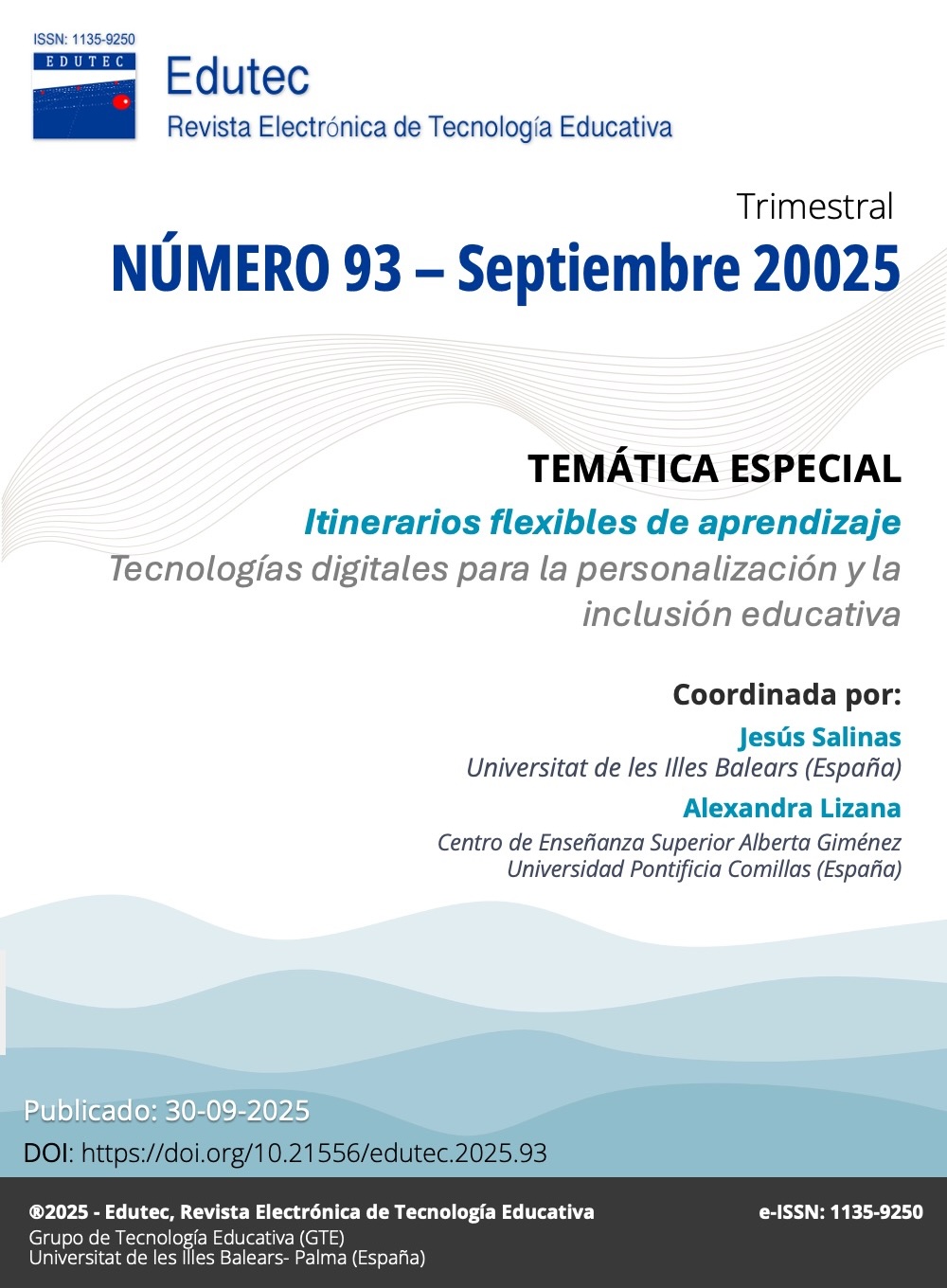Teachers' perceptions of the advantages and disadvantages of Artificial Intelligence at a Peruvian university
DOI:
https://doi.org/10.21556/edutec.2025.93.3835Keywords:
artificial intelligence, higher education, faculty perceptions, personalized learning, technological dependenceAbstract
The rapid development of Artificial Intelligence (AI) has disrupted various areas of life, including education. The objective was to understand the perceptions of faculty members at the National University of Central Peru (UNCP) regarding the advantages and disadvantages of AI in higher education. The study used a quantitative approach, with a non-experimental, cross-sectional-descriptive design. The instrument (questionnaire) was subjected to expert opinion and exploratory factor analysis, applied to a sample of 304 faculty members, either online or in person. The results showed that the majority of faculty members perceive AI to have significant advantages (Gaussian Z, p < .01) in learning personalization, educational data analysis, instant feedback, and accessibility. They also perceive AI to have significant disadvantages (Gaussian Z, p < .01) in the lack of human interaction, potential data bias, and technological dependence. In conclusion, the teachers surveyed perceive that AI has advantages and disadvantages, and its use in the country's universities demonstrates a significant impact on the educational practices of teachers and students.
Funding
Universidad Nacional del Centro del Perú
Downloads
References
Al-Tkhayneh, K., Alghazo, E. y Tahat, D. (2023). The Advantages and Disadvantages of Using Artificial Intelligence in Education. Journal of Educational and Social Research, 13(4), 105-117. https://doi.org/10.36941/jesr-2023-0094 DOI: https://doi.org/10.36941/jesr-2023-0094
Alarcón-Llontop, L.R., Pasapera-Ramírez, S. y Torres-Mirez, K. (2023, 17 al 21 de julio). The ChatGPT Application: Initial Perceptions of University Teachers [Conferencia]. 21 LACCEI International Multi-Conference for Engineering, Education, and Technology: Leadership in Education and Innovation in Engineering in the Framework of Global Transformations: Integration and Alliances for Integral Development, Buenos Aires, Argentina. https://laccei.org/LACCEI2023-BuenosAires/papers/Contribution_336_a.pdf DOI: https://doi.org/10.18687/LACCEI2023.1.1.336
Alvarado, M.E. (2015). Una mirada a la Inteligencia Artificial. Revista de Ingeniería, Matemáticas y Ciencias de la Información, 2(3), 27-31. https://ojs.urepublicana.edu.co/index.php/ingenieria/article/view/234/213
Aparicio-Gómez, W.O (2023). La Inteligencia Artificial y su incidencia en la educación: Transformando el aprendizaje para el siglo XXI. Revista Internacional de Pedagogía e Innovación Educativa, 3(2), 2017-229. https://editic.net/journals/index.php/ripie/article/view/156/143 DOI: https://doi.org/10.51660/ripie.v3i2.133
Chávez, G.P., Castro, J.K., Ibarra, M.A. y Tobar, Y.F. (2024). La inteligencia artificial en la educación superior: oportunidades y amenazas. RECIAMUC, 8(1), 71-79. https://reciamuc.com/index.php/RECIAMUC/article/view/1244 DOI: https://doi.org/10.26820/reciamuc/8.(1).ene.2024.71-79
De Hoyos, S. M. (2020). El método científico y la filosofía como herramientas para generar conocimiento. Revista Filosofía UIS, 19(1), 229-245. https://revistas.uis.edu.co/index.php/revistafilosofiauis/article/view/9291/10104 DOI: https://doi.org/10.18273/revfil.v19n1-2020010
Faliero, J. (2021). Limitar la dependencia algorítmica Impactos de la inteligencia artificial y sesgos algorítmicos. Nueva Sociedad (294), 120- 129. https://biblat.unam.mx/hevila/Nuevasociedad/2021/no294/11.pdf
Ferrantes, E. (2021). Inteligencia artificial y sesgos algorítmicos ¿Por qué deberían importarnos? Nueva sociedad (294), 21-36. https://biblat.unam.mx/es/revista/nueva-sociedad/articulo/inteligencia-artificial-y-sesgos-algoritmicos-por-que-deberian-importarnos
Gallent-Torres, C., Zapata-González, A. y Ortego-Hernando, J.L. (2023). El impacto de la inteligencia artificial generativa en educación superior: una mirada desde la ética y la integridad académica. RELIEVE, 29(2), 1-20. https://revistaseug.ugr.es/index.php/RELIEVE/article/view/29134/26516 DOI: https://doi.org/10.30827/relieve.v29i2.29134
Giannini, S. (2023). La IA generativa y el futuro de la educación. UNESCO. https://unesdoc.unesco.org/ark:/48223/pf0000385877_spa
Granda, M.F., Muncha, I.J., Guamanquispe, F.V. y Jácome, J.H. (2024). Inteligencia Artificial: ventajas y desventajas de su uso en el proceso de enseñanza aprendizaje. MENTOR Revista de Investigación Educativa y Deportiva, 3(7), 202-224. https://revistamentor.ec/index.php/mentor/article/view/7081/5979 DOI: https://doi.org/10.56200/mried.v3i7.7081
Haro, A.F., Chisag, E.R., Ruiz, J.P. y Caicedo, J.E. (2024). Tipos y clasificación de las investigaciones. LATAM, 5(2), 956-966. https://latam.redilat.org/index.php/lt/article/view/1927/2478 DOI: https://doi.org/10.56712/latam.v5i2.1927
Hernández, R. y Mendoza, C. (2018). Metodología de la investigación. Las rutas cuantitativa, cualitativa y mixta. McGraw-Hill Interamericana.
ISDI DIGETALENT GROUP. (28 de noviembre de 2023). 10 desventajas de la inteligencia artificial a tener en cuenta. https://www.isdi.education/es/blog/desventajas-de-la-inteligencia-artificial#
Jara, I. y Ochoa, J. (2020). Usos y efectos de la inteligencia artificial en la educación. Banco Interamericano de Desarrollo. https://ie42003cgalbarracin.edu.pe/biblioteca/LIBR-NIV331012022134652.pdf DOI: https://doi.org/10.18235/0002380
Jiménez, L.L. (2020). Impacto de la investigación cuantitativa en la actualidad. Convergence Tech Revista Científica, 4(1), 59-68. https://revista.sudamericano.edu.ec/index.php/convergence/article/view/35/2 DOI: https://doi.org/10.53592/convtech.v4iIV.35
Leyva, M.Y., Estupiñán, J. y Vega, V. (2022). La inteligencia artificial y su aplicación en la enseñanza del Derecho. Estudios del Desarrollo Social: Cuba y América Latina, 10(3), 368-380. https://revistas.uh.cu/revflacso/article/view/148/125
Manterola, C., Quiroz, G., Salazar, P. y García, N. (2019). Metodología de los tipos y diseños de estudio más frecuentes utilizados en la investigación clínica. Revista Médica Clínica Las Condes, 30(1), 36-49. https://www.sciencedirect.com/science/article/pii/S0716864019300057 DOI: https://doi.org/10.1016/j.rmclc.2018.11.005
Martínez-Alvarez, N. y Martínez-López, L. (2024). Sinergia Piaget, Vygotsky y la inteligencia artificial en la educación universitaria. Vincula Tégica EFAN, 10(4), 70-84. https://vinculategica.uanl.mx/index.php/v/article/view/948/1036 DOI: https://doi.org/10.29105/vtga10.4-948
Morduchowicz, R. (2023). La Inteligencia Artificial ¿Necesitamos una nueva educación? UNESCO. https://unesdoc.unesco.org/ark:/48223/pf0000386262
Ocaña-Fernández, Y., Valenzuela-Fernández, L.A. y Garro-Aburto, L.L. (2019). Inteligencia artificial y sus implicaciones en la educación Superior. Propósitos y representaciones, 7(2), 536-568. https://revistas.usil.edu.pe/index.php/pyr/article/view/274/552 DOI: https://doi.org/10.20511/pyr2019.v7n2.274
Ramos, C. (2020). Los alcances de la investigación. CienciAmérica, 9(3), 1-5. https://www.cienciamerica.edu.ec/index.php/uti/article/view/336/621 DOI: https://doi.org/10.33210/ca.v9i3.336
Rodríguez, A.F., Orosco, K.E., Garcia, J.A. y Rodríguez, S.D. y Barros, H.A. (2023). La implementación de la Inteligencia Artificial en la educación: Análisis sistemático. Revista Científica Dominio de las Ciencias, 9(3), 2162-2113. https://dominiodelasciencias.com/ojs/index.php/es/article/view/3548
Salas-Pilco, S.Z., Xiao, K. y Hu, X. (2022). Inteligencia artificial y analítica del aprendizaje en la formación docente: una revisión sistemática. Ciencias de la Educación, 12(8) 569. https://doi.org/10.3390/educsci12080569 DOI: https://doi.org/10.3390/educsci12080569
Sanz, Q. (2024). Bill Gates, sobre la IA: «Volveremos a pensar como en el 1900». Hipertextual. https://hipertextual.com/2024/04/bill-gates-sobre-la-ia-volveremos-a-pensar-como-en-el-1900
UNESCO. (10 de octubre de 2023). Educación e Inteligencia Artificial. https://www.unesco.org/es/articles/la-inteligencia-artificial-necesitamos-una-nueva-educacion
Vera, F. (2023). Integración de la Inteligencia Artificial en la Educación superior: Desafíos y oportunidades. Revista electrónica transformar, 4(1), 17-34. https://www.revistatransformar.cl/index.php/transformar/article/view/84
Xue, Y. y Wang, Y. (2022). Artificial Intelligence for Education and Teaching. Wireless Communications and Mobile, 2022, 1-10. https://onlinelibrary.wiley.com/doi/epdf/10.1155/2022/4750018 DOI: https://doi.org/10.1155/2022/4750018
Published
How to Cite
Issue
Section
License
Copyright (c) 2025 Edutec, Revista Electrónica de Tecnología Educativa

This work is licensed under a Creative Commons Attribution 4.0 International License.
By submitting the paper, the authors assign the publication rights to the journal Edutec. For its part, Edutec authorises its distribution as long as its content is not altered and its origin is indicated. At the end of each article published in Edutec, the citation procedure is indicated.
The management and editorial board of Edutec Revista Electrónica de Tecnología Educativa do not accept any responsibility for the statements and ideas expressed by the authors in their work.
Translated with www.DeepL.com/Translator (free version)









